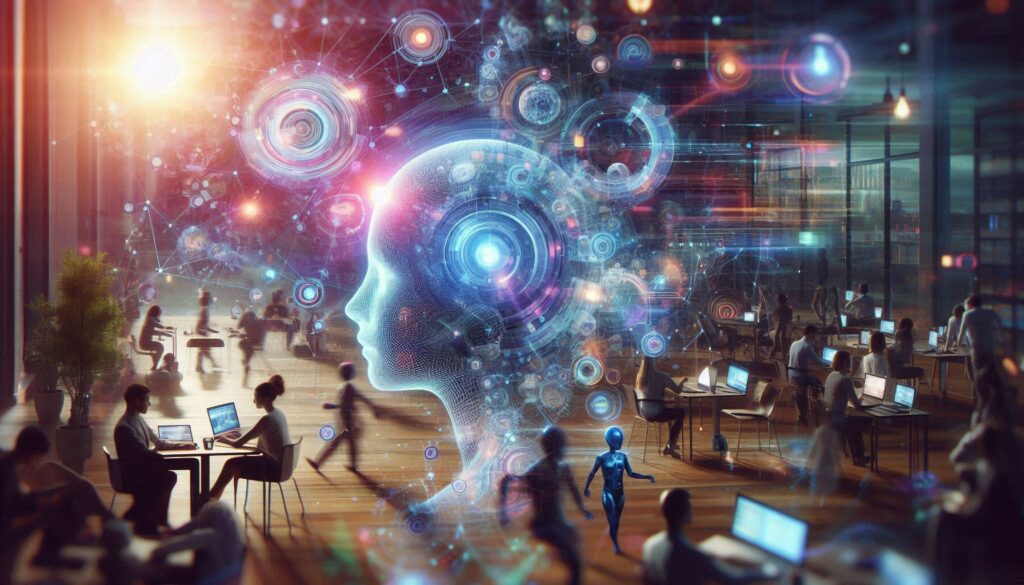Introduction to Artificial Intelligence
Artificial Intelligence (AI) is revolutionizing the world as we know it. From self-driving cars to virtual assistants, AI is embedded in our daily lives, transforming industries and enhancing human capabilities. But what exactly is AI, and how does it work?
History of AI
The concept of AI isn’t as modern as one might think. It dates back to the mid-20th century. Here’s a detailed timeline of significant milestones in AI development:
| Year | Milestone |
|---|---|
| 1950 | Alan Turing proposes the Turing Test to determine if a machine can exhibit intelligent behavior. |
| 1956 | The term “Artificial Intelligence” is coined at the Dartmouth Conference, marking the birth of AI as a field. |
| 1960s | The advent of early AI programs like ELIZA, a natural language processing computer program. |
| 1980s | The rise of expert systems that mimic the decision-making abilities of a human expert. |
| 1997 | IBM’s Deep Blue defeats world chess champion Garry Kasparov. |
| 2011 | IBM’s Watson wins Jeopardy!, showcasing advanced natural language processing and information retrieval capabilities. |
| 2016 | AlphaGo, developed by DeepMind, defeats a world champion Go player, demonstrating the power of deep learning. |
Types of AI
Understanding AI involves recognizing its different forms:
Narrow AI
Narrow AI, also known as Weak AI, is designed for specific tasks. Examples include voice assistants like Siri and Alexa, recommendation systems, and autonomous vehicles.
General AI
General AI, or Strong AI, has the capability to understand, learn, and apply knowledge across a wide range of tasks at a human level. This type of AI remains theoretical and is a significant focus of ongoing research.
Superintelligent AI
Superintelligent AI surpasses human intelligence across all aspects, including creativity, problem-solving, and emotional intelligence. This form of AI is purely speculative and poses numerous ethical and existential risks.
Key Technologies Behind AI
Several key technologies drive the functionality and advancement of AI:
Machine Learning
Machine Learning (ML) involves algorithms that enable computers to learn from and make decisions based on data. It is the backbone of many AI applications, from email filtering to predictive analytics.
Deep Learning
Deep Learning, a subset of ML, uses neural networks with many layers (hence “deep”) to analyze various factors of data. It’s particularly effective in image and speech recognition.
Neural Networks
Neural Networks are inspired by the human brain’s structure. They consist of interconnected nodes (neurons) that process information in layers, enabling complex pattern recognition.
Natural Language Processing (NLP)
NLP allows machines to understand and respond to human language. Applications include chatbots, language translation, and sentiment analysis.
Computer Vision
Computer Vision enables machines to interpret and make decisions based on visual data from the world. This technology is crucial for facial recognition, autonomous driving, and medical image analysis.
Applications of AI
AI’s versatility means it has a wide range of applications across various sectors:
In Business
AI enhances business operations through automation, data analysis, and customer service. Predictive analytics and AI-driven marketing strategies optimize business performance and customer engagement.
In Healthcare
In healthcare, AI assists in diagnostics, personalized treatment plans, and administrative tasks. Machine learning algorithms analyze medical images, predict disease outbreaks, and streamline patient care.
In Finance
AI in finance helps with fraud detection, algorithmic trading, and risk management. It also powers robo-advisors, providing personalized financial advice based on user data.
In Everyday Life
From virtual assistants and smart home devices to recommendation algorithms on streaming services, AI simplifies and enriches our daily lives.
Generative AI: The Future of Content Creation
Generative AI refers to AI systems capable of creating new content, such as text, images, and music. Technologies like GPT-4 and DALL-E are at the forefront, producing human-like text and original art. This capability opens new avenues for creativity and efficiency but also raises ethical questions about authorship and originality.

Challenges and Ethical Considerations
The rise of AI brings significant challenges and ethical concerns:
- Bias and Fairness: AI systems can perpetuate and amplify biases present in training data.
- Privacy: The vast amount of data required for AI can threaten individual privacy.
- Job Displacement: Automation could lead to significant job losses in various sectors.
- Autonomy and Control: Ensuring human oversight and control over advanced AI systems is crucial to prevent unintended consequences.
The Future of AI
The future of AI holds immense potential and promises continued advancements in various fields:
- Advanced Personal Assistants: Future AI will provide more personalized and context-aware interactions.
- Healthcare Innovations: AI will revolutionize drug discovery, personalized medicine, and patient care.
- Enhanced Autonomous Systems: From self-driving cars to drones, autonomous systems will become more reliable and widespread.
- Ethical AI Development: Efforts to create fair, transparent, and accountable AI systems will intensify.
Conclusion
Artificial Inelligence is a transformative technology reshaping various aspects of our world. From its historical beginnings to its modern-day applications, AI has made significant strides in enhancing our daily lives, driving business innovations, and advancing healthcare and finance sectors. Understanding the different types of AI, including Narrow AI, General AI, and Superintelligent AI, helps us appreciate the complexities and potentials of this field.
As AI continues to evolve, it’s crucial to address the ethical considerations and challenges it brings, ensuring that its development and deployment are guided by principles that prioritize fairness, transparency, and human welfare. The future of AI holds promising advancements, from smarter personal assistants to groundbreaking innovations in numerous industries.
By staying informed and engaged with the developments in AI, we can better prepare for a future where intelligent systems are integral to our lives, driving progress and fostering a more connected and efficient world.

